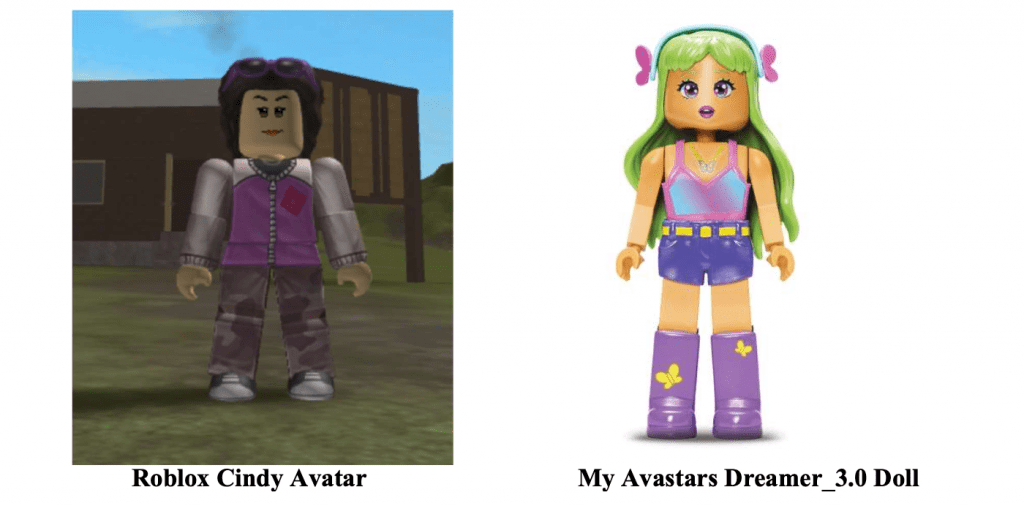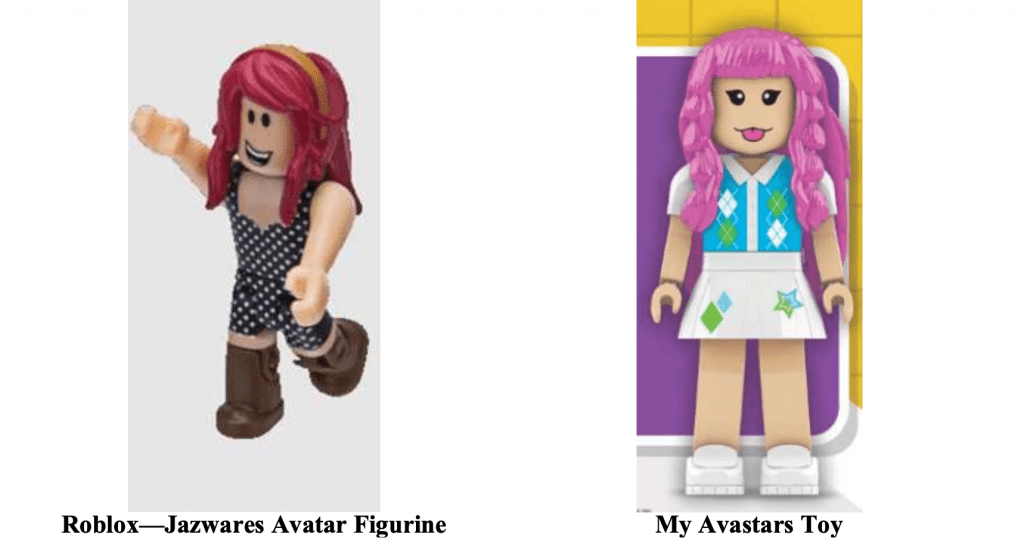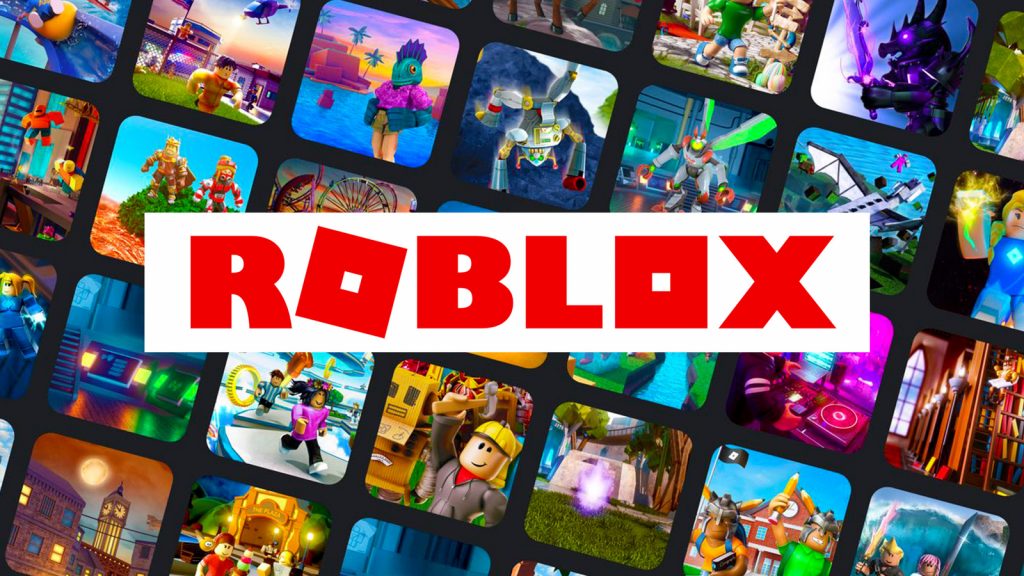A lawsuit over metaverse avatars is set to play out in the “real” world, with Roblox accusing toy company WowWee Group Limited of copying its “wildly successful avatar intellectual property to create and sell a line of physical dolls to exploit Roblox’s investment, creative efforts, and popularity in the marketplace for their own profit.” According to the complaint that it filed in a federal court in California on August 2, Roblox alleges that WowWee Group Limited – and a number of other defendants – (collectively “WowWee”) are on the hook for copyright and trademark infringement, intentional interference with contractual relations, and breach of contract, among other causes of action, for “reproducing Roblox’s avatars as a line of toys, marketing them in connection with a Roblox experience, and misleading consumers into believing that these actions were sanctioned by Roblox.”
Setting the stage in the newly-filed complaint, Roblox asserts that over the past two decades, it has developed “one of the top online platforms for games and other experiences.” At the “core” of its appeal, the San Mateo, California-based company claims are its “distinctive and copyrighted characters, or ‘avatars,’ which are the digital manifestations of the millions of users who visit the Roblox Platform every day.” Roblox claims that it “encourages users and creators to modify and engage with its creations and intellectual property on the Roblox Platform,” including its avatars – which it describes as “humanoid figures with cylindrical heads, C-shaped hands, block-shaped bodies and legs, square or rounded arms, and cartoon-like facial expressions.”
At the same time, however, the popular metaverse platform requires users to agree that “absent express permission from Roblox, they will not make use of certain Roblox content outside the Platform, monetize that content for their own purposes, or imply an association with or sponsorship by Roblox for their offline businesses.” These controls are “necessary,” according to Roblox, in order to protect its “brand, content, and intellectual property, which are at the center of Roblox’s success,” and to protect “the significant investments that Roblox has made to create content, such as Classic Avatars.”

Against this background, Roblox alleges in its new lawsuit that Montreal-headquartered toy-maker WowWee “saw a chance for a quick buck and decided to make toy copies of Roblox’s avatars” by way of physical dolls it dubbed “My Avastars.” Not content to “simply infringe Roblox’s copyrights in its avatars,” Roblox claims that “WowWee also wanted to exploit the experiences on Roblox’s Platform for its own benefit, [and] to accomplish that goal, WowWee induced one of Roblox’s top experience developers, Gamefam, to partner with it so WowWee’s infringing My Avastars dolls could be paired with a Roblox Platform experience – My Avastars: RP.”
Roblox asserts that WowWee paired its dolls with “a Roblox ‘experience’ (the term used to describe games and similar digital environments on the Roblox Platform) specifically so the experience could be connected with the dolls and used in promotional materials, along with Roblox’s name – all of which directly violate Roblox’s Terms of Use and longstanding intellectual property rights.” WowWee goes even further, according to the complaint, as in promoting the infringing dolls, it “has implied that its products are associated with and sanctioned by Roblox – a ploy aimed directly at profiting off of Roblox’s popularity.” (Roblox asserts that “because of [its] skyrocketing popularity, demand for toys based on [its] brand has skyrocketed, too,” leading the company to enter into “only a select few licensing agreements” with third-party manufacturers, including Jazwares, which makes physical toys based on Roblox’s avatars.)
Setting out claims of copyright and trademark/trade dress infringement, as well as unfair competition and false designation of origin, in the lawsuit, Roblox asserts that its avatars not only have a “distinctive” (unregistered) trade dress, “rendering them protectable under the Lanham Act,” but they the designs are registered with the U.S. Copyright Office.
On the trade dress front, Roblox asserts that its avatars have “a distinct overall look and feel” that stems from their: “(1) humanoid, blocky shape; (2) cylindrical heads; (3) C-shaped hands; (4) block-shaped legs; (5) square or rounded arms; (6) cartoon-like facial expressions and lack of a nose; and (7) the particularized combination of these elements.” This “distinct look” has remained consistent since Roblox first developed its avatar design in 2007, the company claims, and thus, “consumers identify this distinct look and feel with the Roblox Platform,” making it so that consumers are likely to be confused about the source of the defendants’ “My Avastars” dolls.
(For a point of comparison, LEGO A/S describes the registered trade dress of its mini figurines, as “the three-dimensional configuration of a toy figure featuring a cylindrical head, on top of a cylindrical neck, on top of a trapezoidal torso of uniform thickness, with flat sides and a flat back, where arms are mounted slightly below the upper surface of the torso, on top of a rectangular plate, on top of legs which bulge frontwards at the top and are otherwise rectangular with uniform thickness, on top of flat square feet.”)

“Just like” its avatars and licensee Jazwares’ physical toy offerings, Roblox alleges that the defendants’ “My Avastars” consist of “humanoid figures with cylindrical heads, C-shaped hands, block-shaped bodies and legs, square or rounded arms, and cartoon-like facial expressions that lack a nose,” making it likely that consumers will confuse the My Avastars dolls for Roblox and Jazwares’ products. Roblox also claims that the defendants are on the hook for trademark infringement in connection with its use of the Roblox word mark and stylized logo “on their social media accounts and/or website to advertise the My Avastars dolls and divert consumers looking for Roblox toys away from Jazwares’ Avatar Figurines and toward the My Avastars dolls for the purpose of commercial gain.”
In terms of its copyright claim, Roblox asserts that its “Classic Avatars, including the Roblox Classic Avatar bases and all derivative works thereof, constitute original works of authorship and copyrightable subject matter,” which the defendants infringed by modifying to create the My Avastars dolls – which Roblox claims amount to “substantially similar” derivative works. (Are they substantially similar?) The defendants then went on to “copy, reproduce, offer for sale, and publicly display those derivative works, which incorporate Roblox’s copyrighted Roblox avatars and Classic Avatars bases, on [their] website and other third-party websites,” the company claims.
Still yet, Roblox alleges in the lawsuit that WowWee has engaged in intentional interference with contractual relations and breach of contract for violating the Terms of Use that must be accepted before anyone can create an account and access the Roblox Services, namely by infringing Roblox’s alleged rights in the avatar designs, as well as the Roblox name and logo. Beyond that, Roblox asserts that WowWee knew that Gamefam – “the first and only fully-dedicated, professional game publishing company on Roblox” – had similarly agreed to the terms, including “‘promis[ing] and commit[ting] not to make any use of Classic Avatars or Modified Classic Avatars’ that is prohibited by [Roblox’s] Terms.” As such, by enlisting Gamefam to create “a doll specifically for use with a Roblox experience,” WowWee “deliberately and intentionally interfered with the contractual relationship between Roblox and Gamefam” and caused Gamefam “to violate numerous provisions in the Terms.” (Gamefam is not listed as a defendant in Roblox’s complaint.)
Roblox says that it is looking “to halt WowWee’s blatant and admitted copying of Roblox’s copyrighted works, and to put a stop to WowWee’s ongoing efforts to profit off of Roblox’s trademarks, trade dress, and hard-won reputation and success” by way of preliminary and permanent injunctive relief, and is also seeking monetary damages, namely, actual damages, as well as all of the defendants’ profits or gains of any kind from its acts of infringement, including a trebling of those damages and profits.
UPDATED: WowWee issued a lengthy statement in response to the Roblox lawsuit, asserting that it believes that Roblox’s allegations are “completely meritless,” and that its “actions are another example of a company using litigation as a growth strategy. Despite being a publicly traded corporate giant with a multi-billion-dollar revenue stream, it is targeting a family business whose goal is to provide children with another way to express their individuality through play. Yet, as parents have been teaching their children for generations, giving into a bully encourages them to bully again.”
WowWee also stated, “Since Roblox began as a platform that encouraged collaboration with its users (to Roblox’s benefit), WowWee believed My Avastars would be a welcome addition to the Roblox platform. However, in June 2022, a week after WowWee publicly announced the creation of its My Avastars dolls, Roblox changed its terms of use to the detriment of the creative community.”
The case is Roblox Corp. et al, v. WowWee Group Limited, et al, 3:22-cv-04476 (N.D. Cal.)











